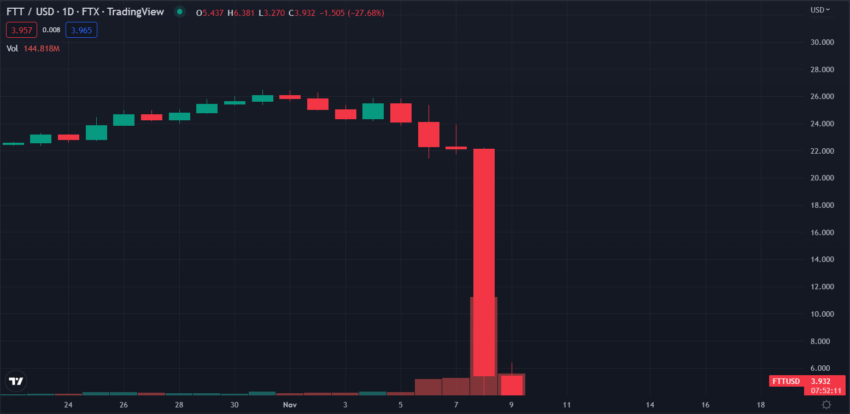Cardano founder Charles Hoskinson says that if FTX fails Binance’s due diligence process, the effects on the crypto market could be catastrophic.
Hoskinson said in a vlog post that there is a nonzero chance that FTX could fail due diligence and undergo liquidation because due diligence often reveals the actual depth of a company’s financial distress. Hoskinson’s worst-case scenario could become a reality after unconfirmed reports surfaced that Binance is unlikely to proceed with the FTX deal. This bombshell comes after less than 24 hours of due diligence by the exchange.
FTX CEO’s political ties a concern
If the recent rumors of Binance’s reluctance prove true, FTX’s failure could cascade through the industry, similar to how the failure of Lehman Brothers rippled through the global economy in 2008. Ensuing collapses could then prompt negative scrutiny from the political allies FTX CEO Sam Bankman-Fried had recently attempted to woo.
Bankman-Fried contributed at least $27 million to a Protect Our Future Political Action Committee in the run-up to the 2022 U.S. midterm elections. The PAC, in turn, splashed more than $11 million on Democratic candidate Carrick Flynn, who lost the primaries in Oregon.
Bankman-Fried also tried to shore up Republican alliances, contributing thousands to John Boozman of Arkansas and John Hoeven of North Dakota.
In an ironic twist, these and other politicians could impose draconian laws on the industry if the Binance deal fails, Hoskinson said.
Binance CEO Changpeng ‘CZ’ Zhao echoed this sentiment in a note to Binance employees. He emphasized that the failure of FTX was not a win for Binance.
“Regulators will scrutinize exchanges even more. Licenses around the world will be harder to get,” he said.
Already former SEC Commissioner Jay Clayton has said that “we need coordinated action across the federal government. People are going to test whether the capital problems around this exchange have been resolved.”
Ultimately, he said, creditors to Lehman Brothers were paid out, even if the institution didn’t have enough liquidity at the time. With FTX standing proxy for Lehman Brothers, such a scenario isn’t guaranteed in the less regulated crypto industry.
Speaking of regulation, a recent Bloomberg report reveals that the Securities and Exchange Commission and the Commodities and Futures Trading Commission are probing FTX’s handling of customer funds. They are also investigating links between FTX, its American sister company FTX.US and Bankman-Fried’s quant trading firm Alameda Research.
CZ promises greater transparency
In preparation for scrutiny, CZ also tweeted today that Binance would start to do Merkle-tree Proof-of-Reserves.
In step with Binance, several other exchanges, including KuCoin, OKX, Poloniex, and Huobi, announced that they would adopt the measure.
A Merkle tree is a computer science construct that summarizes all transactions in a blockchain transaction block. It produces a fingerprint of transactions in a block that makes it easy to identify whether a particular transaction occurred. So Merkle-tree proof-of-reserves could point to a method of verifying reserves using blockchain transaction data.
FTX investors look to cut their losses
For the moment, however, several high-profile firms will likely have to write off their FTX investments, collectively worth $32 billion. Firms likely to lose their investments include Softbank, Sequoia Capital, and Tiger Global. According to CNBC, Binance will likely buy FTX for “pennies on the dollar.” The battled exchange also made some high-profile investments of its own. Investing in the likes of Yuga Labs, Circle, and SkyBridge.
Circle CEO Jeremy Allaire pointed out in a CNBC interview with Andrew Ross Sorkin that the sharp decline in the price of FTX’s native token, FTT, could spell trouble for lenders who accepted it as collateral for loans.
At press time, FTT had recovered to around $3.93 after previously falling to $3.12 in the last 24 hours.
 Source: TradingView
Source: TradingView
In a parting shot, Zhao warned Binance employees not to sell or buy FTT.





